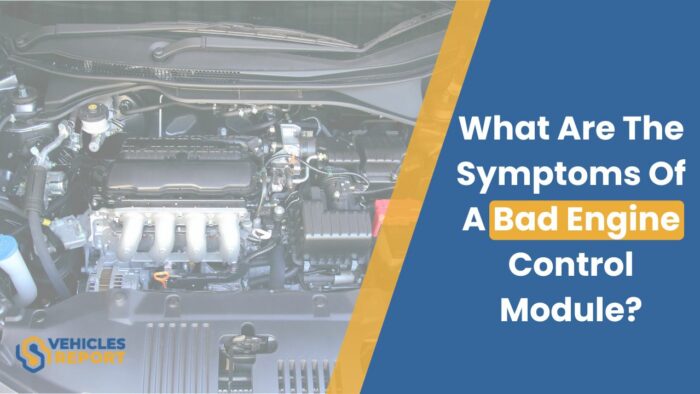The engine Control Module is the master key, which controls engine and transmission functions. Hence, if this computer goes bad, many things tend to malfunction. This article will help you understand what symptoms to look out for so you can become your own “auto-doc” and “diagnose” this problem correctly.
Think of it like a maestro of an orchestra. The ECM receives signals from various sensors throughout the engine bay, like the engine’s temperature, air intake, and even how fast the crankshaft is spinning.
It then processes this information using its internal microprocessor, similar to a computer’s brain. The ECM determines the ideal settings for different engine components by comparing this data to pre-programmed settings.
The ECM sends instructions to various engine parts based on these calculations, acting like the conductor signaling the musicians.
The Evolution of ECMs
The Engine Control Module (ECM) has come a long way since its beginnings. Early cars relied on mechanical systems for engine control, which led to imprecise performance and dirty emissions.
In the 1970s, stricter emission regulations forced car manufacturers to develop a more sophisticated solution.
The first ECMs were born, using analog technology and basic sensors to monitor limited engine parameters. These early systems laid the foundation for the future but were not very precise.
The 1980s brought a digital revolution that transformed the ECM. Microprocessors replaced bulky analog parts, allowing for complex calculations and precise control of engine functions.
This shift led to a broader range of sensors, customization for different engines, and the ability for ECMs to diagnose problems. The future holds even more promise, with machine learning, integration with advanced systems, and remote diagnostics all on the horizon.
Functions of the ECM
Although the ECM is expected to be developed into a more efficient tool in the future, in the meantime, it performs the following functions:
- Adjusting the fuel injectors to deliver the precise amount of fuel needed.
- Controlling the ignition system to ensure spark plugs fire at the exact moment for optimal combustion.
- Regulating the idle speed by adjusting the throttle valve to maintain a steady engine hum.
- Working with emission control systems to minimize pollutants in the exhaust.
- Even activating warning lights or limiting engine power to prevent damage if it detects something amiss.
The Symptoms Of A Bad Engine Control Module
A malfunctioning Engine Control Module (ECM) can cause various issues in your car’s performance. While a faulty ECM doesn’t necessarily mean your car will grind to a halt immediately, it can significantly impact how your vehicle runs. Here are some key signs to watch out for:
- Malfunction Indicator Light (MIL) Illuminates: This is often the first and most noticeable sign of an ECM problem. The ECM constantly monitors various engine parameters, and if it detects a malfunction outside the acceptable range, it triggers the MIL, also known as the “check engine light,” to warn you of a potential issue.
- Poor Performance: A faulty ECM can negatively impact engine performance in several ways. It might send incorrect signals to engine components like fuel injectors or the ignition system, leading to a lean or rich air-fuel mixture, erratic spark timing, or incomplete combustion. These issues can manifest as reduced power, hesitation during acceleration, or rough idling.
- Hard Starting and/or Stalling: The ECM regulates engine functions during startup and idling. If the ECM malfunctions, it might not deliver the optimal fuel mixture or ignition timing required for a smooth start. This can result in difficulty starting the engine or unexpected engine stalling.
- Increased Emissions: The ECM is responsible for managing various emission control systems. A faulty ECM can disrupt this delicate balance, causing the engine to run outside its intended parameters. This can increase harmful pollutants like hydrocarbons, nitrogen oxides, and carbon monoxide released in the exhaust.
- Poor Fuel Economy: The ECM is essential in optimizing fuel consumption by precisely controlling the air-fuel mixture and engine operation. If the ECM malfunctions, it might cause the engine to run richer than necessary, wasting fuel. This can lead to a noticeable decrease in your car’s fuel efficiency.
Remember, these symptoms can also be caused by issues other than a faulty ECM. It’s essential to have a qualified mechanic diagnose the problem using specialized scan tools to pinpoint the exact cause and determine if the ECM is the culprit.
Did you know?
A modern Engine Control Module (ECM) can process sensor data and adjust engine operation thousands of times per second. This incredible processing power allows for exact control and optimization of a car’s engine for performance, efficiency, and emissions.
How to Check If a Car Had a Bad ECM
A vehicle history report can provide indirect clues about a car’s potential ECM problems. If the report mentions repairs related to the engine control system, like sensor replacements or even ECM itself, it warrants further investigation.
Additionally, some reports might include decoded trouble codes that could point toward ECM malfunctions. However, these reports have limitations. Not all repairs are documented, and the details provided might be limited.
To get a clearer picture of past ECM issues, it is recommended that you talk directly with the seller or take the car to a mechanic for a pre-purchase inspection.
Mechanics can use specialized tools to scan the ECM for trouble codes and assess its overall health, giving you a more definitive answer. You can also run a VIN check to obtain a vehicle history report.
The engine control unit (ECU), also known as the powertrain control module (PCM), plays a pivotal role in automotive engine management.
Common symptoms of ECU or PCM issues include engine misfires, erratic performance, and difficulty starting. These problems can significantly impact vehicle performance and fuel efficiency. Proper diagnosis and timely maintenance are crucial to address engine control unit issues and ensure the smooth operation of your vehicle.








